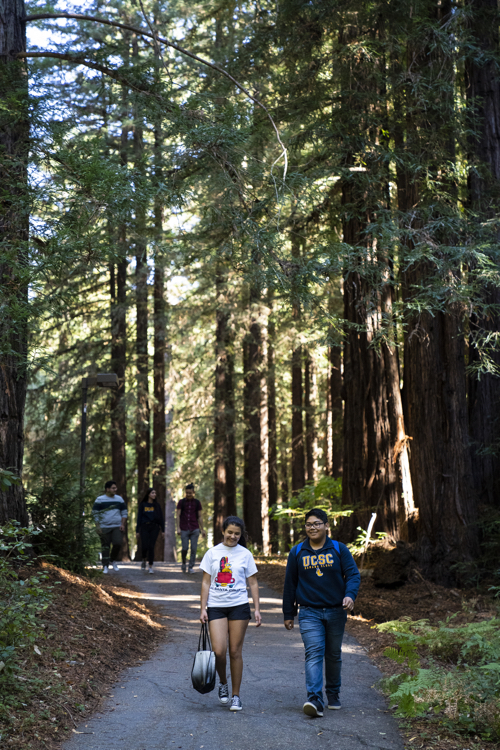Campus News
UC Santa Cruz admits fall class that reflects excellence, diversity
UC Santa Cruz anticipates welcoming about 6,100 new Banana Slugs this fall, concluding an admissions cycle that began with record applications and has yielded a new cohort that reflects the campus commitment to excellence, equity, and opportunity.

Students walking across campus Oct. 21, 2019. (Nick Gonzales/UC Santa Cruz)

UC Santa Cruz anticipates welcoming about 6,100 new Banana Slugs this fall, concluding an admissions cycle that began with record applications and has yielded a cohort that reflects the campus commitment to excellence, equity, and opportunity.
After receiving more than 74,000 undergraduate applications for fall 2021, staff and faculty leaders worked closely to determine who would be offered admission for the upcoming academic year. The incoming class is both academically distinguished and diverse. The cohort has a mean weighted high school GPA of 3.99 and includes many students who are from low-income families and will be the first in their families to earn a four-year degree.
“The transfer students in the Class of 2023 and first-year students in the Class of 2025 have shown themselves to be well-prepared, determined and resilient scholars,” Chancellor Cynthia Larive said. “We are so excited to welcome them to our campus community to continue their academic journey.”
UC Santa Cruz’s newest cohort joins a university already on an unprecedented trajectory, with faculty pursuing research that is having a transformative impact on society. Reflecting the quality of the campus’ research as well as graduate and undergraduate teaching, UCSC recently joined the Association of American Universities (AAU) and the Association of Pacific Rim Universities.
UC Santa Cruz shares the distinction of being the youngest member of the esteemed 66-member AAU, and is one of only four members that is also a Hispanic-serving institution. The campus also is an Asian American Native American Pacific Islander-Serving Institution. For the second year in a row, UC Santa Cruz was ranked among the top-five universities nationally for student social mobility.
Undergraduate students at UC Santa Cruz experience a small liberal arts college environment with the depth and rigor of a major research university through the pairing of high-impact research with 10 tight-knit residential colleges—a rare combination among U.S. public universities.
Earlier this year, UC Santa Cruz was named the No. 3 public university in the nation for students focused on making an impact on the world, according to Princeton Review. This ranking reinforces what students and alumni know: that UC Santa Cruz is the ideal place for individuals seeking to have an impact on society and to effect real change.
Advancing opportunity, access
In the midst of the worldwide pandemic, the campus admissions team expanded its virtual outreach efforts in high schools and community colleges to ensure students knew about the transformational opportunities available at UC Santa Cruz. With a record number of applications, the faculty committee carefully assessed how to provide access to a high-quality and affordable UC education to a diverse cohort of highly qualified students.
For fall 2021, UC Santa Cruz extended an offer of admissions to 36,375 high school seniors and 7,707 transfer students. More than 26,000 of those seniors were from California and more than 6,900 transfer students were from California community colleges.
The racial and ethnic diversity of admitted students increased this year. UC Santa Cruz extended admissions offers to 1,186 African American high school seniors from California, an 8 percent increase over the previous year. Offers to Chicanx/Latinx first-year students increased by 10 percent.
UC Santa Cruz continued its regional and statewide outreach efforts virtually to increase interest and applications from transfer students who are seeking a four-year degree. Having already completed substantial coursework, transfer students have demonstrated their ability to succeed academically, enter UCSC poised for timely graduation, and add valuable perspectives to its community of scholars. Providing access for California community college students further diversifies the campus community.
UC Santa Cruz takes pride in creating a learning environment that supports cultural and geographic diversity. In support of that, the campus admitted 4,380 international first-year students and 5,167 first-year students from other states.
The broad diversity California, international, and out-of-state first-year and transfer students bring to campus enhances the community through their varied experiences and perspectives and helps prepare students for successful careers in a global environment.
Preparing for fall quarter
UC Santa Cruz is planning to return to predominantly in-person learning this fall, though students who need to stay remote will be able to continue working toward their degree. Planning is underway for winter quarter, which will provide even more in-person experiences, as long as the vaccines continue to be effective against COVID-19 variants. Plans are subject to change pursuant to guidance and directives from federal, state and local health officials.
Fall instruction begins Sept. 23 with move-in starting Sept. 16. The campus will provide housing for about 9,300 students, more than half of the undergraduate class.
Incoming frosh and sophomore students will participate in a robust Welcome Week intended to connect and engage students with each other and the campus. Required Welcome Week sessions will be offered virtually, and optional sessions will be offered both virtually and in-person. Welcome Week is a continuation of the Slug Orientation online courses, and is designed to further introduce new students to vital resources that will support them in their academic and social transition to the university.
Through the required college and major advising presentations, new students will meet staff and faculty from their affiliated college and major. During this week students will have many opportunities to meet other students, learn about student clubs and organizations, and attend workshops that will connect them to work and internship opportunities.